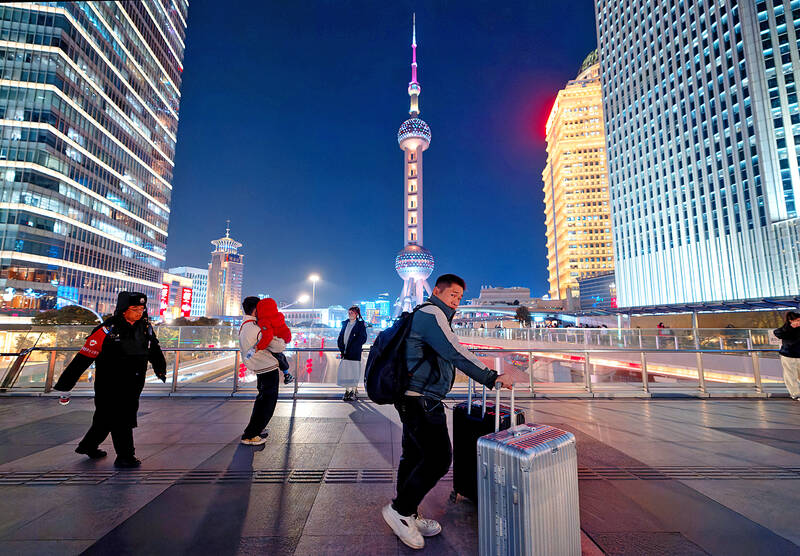China’s economy hit the government’s growth goal last year after an 11th-hour stimulus blitz and export boom turbocharged activity, although looming US tariffs threaten to take away a key driver of expansion.
GDP rose 5 percent in the world’s second-largest economy, data released by the Chinese National Bureau of Statistics yesterday showed, slightly exceeding the median estimate of 4.9 percent in a Bloomberg survey.
“The biggest bright spot in the economy last year was exports, which was very strong, especially if price factor was excluded,” BNP Paribas SA chief China economist Jacqueline Rong (榮靜) said. “That means the biggest problem this year will be US tariffs.”

Photo: EPA-EFE
China has vowed further monetary easing and stronger public spending this year, as its economy braces for US president-elect Donald Trump’s return to the White House.
Trump has threatened tariffs of as high as 60 percent on Chinese goods, which could decimate trade with the Asian country.
Those very threats encouraged global businesses to frontload shipments and bolstered growth last year. However, that boost might fade in the coming months, as potential levies, including from the EU and other trade partners, make Chinese exports less competitive.
The yuan strengthened 0.1 percent against the US dollar in onshore and offshore markets after the data release. The benchmark CSI 300 index of Chinese stocks erased an earlier loss of 0.5 percent to rise 0.5 percent.
“The government has repeatedly alluded to significant support. We see this forthcoming, as Friday’s data hammer home the pressing need. The imperative could become even greater in the case of higher tariffs hitting exports significantly,” Bloomberg economists Chang Shu and David Qu (曲天石) said.
While China’s nearly flawless record in reaching its headline growth target is frequently doubted, the broad set of data also suggests Beijing’s policy pivot since late September last year helped counter headwinds from a years-long property slump and entrenched deflation.
Industrial production beat estimates to rise 6.2 percent last month compared with the previous year, the fastest pace since April last year.
The picture for domestic demand is more mixed. While unemployment climbed for the first time since August last year and property sales continued to contract, consumption showed signs of an uptick in categories helped by the stimulus push.
Retail sales rose 3.8 percent in the last quarter, accelerating to the fastest pace last year after the government ramped up a program to subsidize purchases of appliances, cars and business equipment. That brought home goods sales growth to 12.3 percent, the highest since 2013.
“Front-loaded export orders certainly helped, but the improvement was not just seen in exports, but also in consumption, which was largely a result of purchase subsidies,” Macquarie Group Ltd China economics head Larry Hu (胡偉俊) said.
Economists led by Robin Xing (邢自强) at Morgan Stanley estimate that about 60 percent of the rebound in annual growth was caused by China’s policy to boost consumption and manufacturing investment, while the rest came from advanced shipments.

SEMICONDUCTORS: The German laser and plasma generator company will expand its local services as its specialized offerings support Taiwan’s semiconductor industries Trumpf SE + Co KG, a global leader in supplying laser technology and plasma generators used in chip production, is expanding its investments in Taiwan in an effort to deeply integrate into the global semiconductor supply chain in the pursuit of growth. The company, headquartered in Ditzingen, Germany, has invested significantly in a newly inaugurated regional technical center for plasma generators in Taoyuan, its latest expansion in Taiwan after being engaged in various industries for more than 25 years. The center, the first of its kind Trumpf built outside Germany, aims to serve customers from Taiwan, Japan, Southeast Asia and South Korea,

Gasoline and diesel prices at domestic fuel stations are to fall NT$0.2 per liter this week, down for a second consecutive week, CPC Corp, Taiwan (台灣中油) and Formosa Petrochemical Corp (台塑石化) announced yesterday. Effective today, gasoline prices at CPC and Formosa stations are to drop to NT$26.4, NT$27.9 and NT$29.9 per liter for 92, 95 and 98-octane unleaded gasoline respectively, the companies said in separate statements. The price of premium diesel is to fall to NT$24.8 per liter at CPC stations and NT$24.6 at Formosa pumps, they said. The price adjustments came even as international crude oil prices rose last week, as traders

SIZE MATTERS: TSMC started phasing out 8-inch wafer production last year, while Samsung is more aggressively retiring 8-inch capacity, TrendForce said Chipmakers are expected to raise prices of 8-inch wafers by up to 20 percent this year on concern over supply constraints as major contract chipmakers Taiwan Semiconductor Manufacturing Co (TSMC, 台積電) and Samsung Electronics Co gradually retire less advanced wafer capacity, TrendForce Corp (集邦科技) said yesterday. It is the first significant across-the-board price hike since a global semiconductor correction in 2023, the Taipei-based market researcher said in a report. Global 8-inch wafer capacity slid 0.3 percent year-on-year last year, although 8-inch wafer prices still hovered at relatively stable levels throughout the year, TrendForce said. The downward trend is expected to continue this year,

POWERING UP: PSUs for AI servers made up about 50% of Delta’s total server PSU revenue during the first three quarters of last year, the company said Power supply and electronic components maker Delta Electronics Inc (台達電) reported record-high revenue of NT$161.61 billion (US$5.11 billion) for last quarter and said it remains positive about this quarter. Last quarter’s figure was up 7.6 percent from the previous quarter and 41.51 percent higher than a year earlier, and largely in line with Yuanta Securities Investment Consulting Co’s (元大投顧) forecast of NT$160 billion. Delta’s annual revenue last year rose 31.76 percent year-on-year to NT$554.89 billion, also a record high for the company. Its strong performance reflected continued demand for high-performance power solutions and advanced liquid-cooling products used in artificial intelligence (AI) data centers,